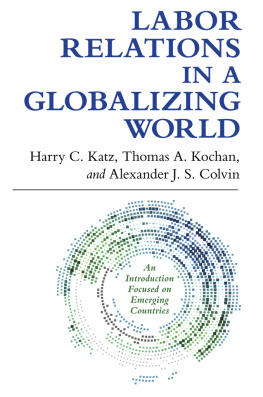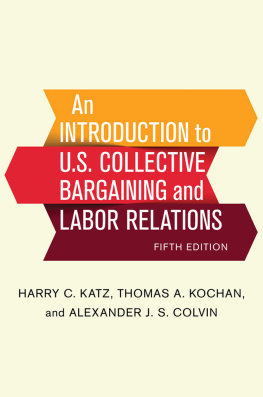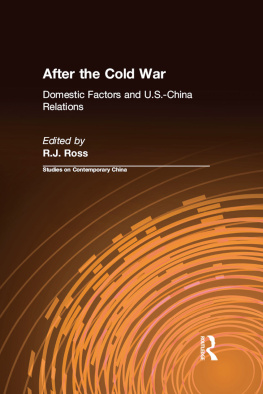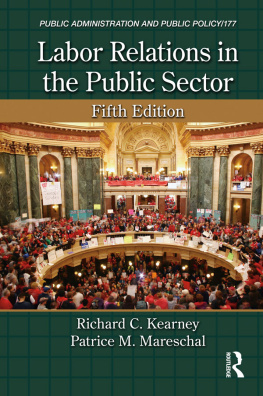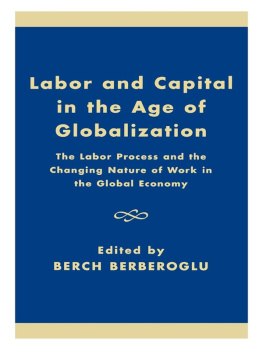About the Authors
Harry C. Katz is the Interim Provost of Cornell University and Dean and Jack Sheinkman Professor of Collective Bargaining at Cornells School of Industrial and Labor Relations (ILR). His major publications include Converging Divergences: Worldwide Changes in Employment Systems (with Owen Darbishire, 2000); Telecommunications: Restructuring Work and Employment Relations Worldwide (1997); and Shifting Gears: Changing Labor Relations in the U.S. Automobile Industry (1985). In 2011, Katz was named a Fellow of the Labor and Employment Relations Association for his scholarly contributions. He serves on the UAW Public Review Board. Dean Katz received his PhD in Economics from the University of California at Berkeley in 1977.
Thomas A. Kochan is the George M. Bunker Professor of Management at MITs Sloan School of Management. Kochan is a past president of the Industrial Relations Research Association and the International Industrial Relations Association. In 1996, he received the Heneman Career Achievement Award. From 1993 to 1995 he served on the Clinton administrations Commission on the Future of Worker/Management Relations, which investigated methods to improve the productivity and global competitiveness of the American workplace. His recent publications include Healing Together: The Kaiser Permanente Labor Management Partnership (2009) and Up in the Air: How Airlines Can Improve Performance by Engaging Their Employees (2009) . Professor Kochan received his PhD in Industrial Relations from the University of Wisconsin in 1973.
Alexander J. S. Colvin is the Martin F. Scheinman Professor of Conflict Resolution at Cornell Universitys School of Industrial and Labor Relations (ILR). His recent publications include co-editing the Oxford Handbook of Conflict Management in Organizations (2014). He received his PhD in Industrial and Labor Relations from Cornell University in 1999 and his JD from the University of Toronto Faculty of Law in 1992. He was a faculty member at The Pennsylvania State University from 1999 to 2008.
Professors Katz and Kochan (with Robert McKersie) are the co-authors of The Transformation of American Industrial Relations , which was awarded the Terry Book Award in 1988 as the most significant contribution to the field of management by the Academy of Management.
Preface
This book covers both generic labor relations issues and how those issues play out in emerging countries. There has never been a text that does so. A new approach is needed given the importance of emerging countries in the global economy and the fact that globalization has shifted the nature of labor relations so that explicitly international factors such as global supply chains, multinational corporations, nongovernmental organizations, and cross-national labor rights and union campaigns are now central determinants.
Using the perspective of industrial relations, this book focuses on workplace outcomes in settings where such outcomes constitute economic activity that leads to the production of goods and services in emerging countries. We draw lessons from how the United States and other advanced industrial countries have structured their labor relations systems at different points in time in order to provide a menu of options for management, labor, and government leaders in emerging countries.
Throughout the book we use the term emerging countries, yet we include in our coverage countries such as China, Korea, and Brazil that might be better labeled as transitional economies, given the advanced levels of economic development they have already achieved. We label the countries we analyze emerging because the labor relations practices and procedures used in those countries are more recent in origin and are in many ways in a state of flux.
We analyze how labor relations functions in emerging countries in a way that is useful to practitioners, policy makers, and academics. This requires, for example, that we take account of the fact that labor relations are much more political in nature in emerging countries than they are in advanced industrialized countries. We also address the traditional role played by state-dominated unions in emerging countries and the recent increased importance of independent unions, which in many of those countries have emerged as alternatives to traditional unions. These independent unions tend to promote firm- or workplace-level collective bargaining, in contrast to the more traditional top-down systems.
The informal sector is also much more prevalent in emerging countries. Collective representation forms and methods of conflict resolution also are more varied in emerging countries not only because they sometimes include works councils but also because concerns about labor rights have led to the involvement of various nongovernmental organizations and other interest groups in workplace matters. In the informal sector, where formal collective negotiations may be absent, nongovernmental organizations perform representation and negotiations roles.
This book makes use of the three-tiered structure of labor relations developed by Kochan, Katz, and McKersie in our analysis of the transformation of U.S. labor relations. However, in this book the three-tiered framework is adapted to take account of the greater role political factors play in labor relations and the increasing role played by nongovernmental organizations and international agencies, such as the World Bank and the International Monetary Fund. In addition, in this book much attention is paid to the role of multinational corporations and cross-national union and labor rights campaigns and to nongovernmental organizations, both because the importance of these factors has increased in all countries in recent years and because these factors are especially important in emerging countries. We continue to make use of the three-tiered framework not because we are blindly wedded to it but because the framework, when appropriately modified, provides a helpful way to understand how labor relations actually workswhat factors shape bargaining power, how bargaining power is exercised, and how political and international forces shape the nature and use of power in emerging countries.
This text provides many illustrations and examples. In particular, we highlight in the text and in numerous box illustrations examples from China, India, Brazil, and South Africa. We focus on these four key countries in particular because each of them is a sizeable contributor to the global economy, is the leading economy in their respective regions of the world, and has features that illustrate phenomena and processes that are common in other emerging countries. Events in those countries also nicely illustrate some of the dynamics found in their respective regions.
This book will be suitable for undergraduates, master students, practitioners, and policy makers who work in the labor relations domain. With the spread of democracy in Asia and Latin America, formerly state-dominated labor movements have begun to be more assertive and more independent forms of unions are emerging. This has led to the nascent spread of real collective negotiations in many countries and stimulated greater interest in the practice and operation of labor relations.
In developing this book we have benefited much from very helpful advice provided by Russell Lansbury, Ming-Wei Liu, and Mark Anner, who served as outside reviewers. As with the many other books we have worked on together, Fran Benson has been a source of much wisdom and encouragement. We are also grateful to Theresa Woodhouse, who helped prepare the manuscript. We also thank our studentsChad Gray, Paulo Ferreira, Sohil Khurana, Rachel Price, Julia Hollreiser, and Nicole Palmadessowho provided able research assistance.

